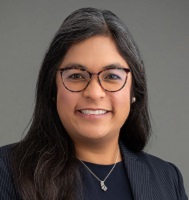

The Environmental Influences on Child Health Outcomes (ECHO) Program in the Office of the Director of the National Institutes of Health (NIH) made 49 awards in support of the second seven-year cycle of the ECHO Cohort Consortium. Two members of the Department of Pediatrics Division of Allergy, Immunology and Rheumatology were among the award recipients: Anne Marie Singh, MD, associate professor and interim division chief, and Jim Gern, MD, professor and vice chair of research for the department. Each of them received a seven-year award that will run from September 1, 2023, to May 31, 2030.
Singh’s project, “Childhood Allergy and the NeOnatal Environment (CANOE) ECHO Pediatric Follow-Up and New Enrollment,” will investigate how neighborhood- and individual-level exposures alter DNA methylation and transcriptional responses at the epithelial barrier to promote asthma and asthma-related disparities. The studies will help identify non-invasive biomarkers and define actionable exposures for intervention. Singh’s research team will follow its existing 125 families and enroll up to 400 more pregnant women and newborns in and around the Madison area. The award is expected to total $10,758,528 over seven years.
Gern’s project, “Wisconsin Infant Study Cohort (WISC) ECHO Pediatric Follow-Up,” will study upper and lower airway disease in children from critical rural underserved populations through innovative studies focusing on how early life factors interact with airway epithelial cells to promote asthma onset and persistence. Gern’s research team will continue to follow 125 families in rural Central Wisconsin, based out of Marshfield, Wisconsin. The award is expected to total $3,842,420 over seven years.
The ECHO Cohort Consortium consists of 45 cohort study sites that conduct observational research to investigate the roles of a broad range of early exposures on five key child health outcomes among diverse populations: Pre-, peri-, and postnatal outcomes; upper and lower airway; obesity; neurodevelopment; and positive health. The ECHO Cohort is expected to double enrollment throughout this currently cycle to include about 60,000 total children and adolescents by 2030.